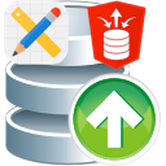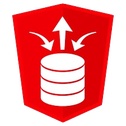Introduction

APEX & ORDS
Oracle APEX
Oracle Application Express (Oracle APEX), is the low-code web application development tool for the Oracle Database. Application Express enables you to design, develop and deploy beautiful, responsive, database-driven applications, either on-premises or in the cloud. Using only a web browser and limited programming experience, you can rapidly develop and deploy professional applications that are both fast and secure for any device, from desktop to mobile. Oracle Application Express combines the qualities of a low-code tool, productivity, ease of use, and flexibility with the qualities of an enterprise development tool, security, integrity, scalability, availability and built for the web.
Oracle REST Data Services (ORDS)
Oracle REST Data Services (ORDS) makes it easy to develop modern REST interfaces for relational data in the Oracle Database and in the Oracle Database 12c JSON Document Store. A mid-tier Java application, ORDS maps HTTP(S) verbs (GET, POST, PUT, DELETE, etc.) to database transactions and returns any results formatted using JSON.
Why APEX?

- No cost option of the Oracle database a.k.a. $0
- Simple to understand, maintain and deploy architecture
- APEX scales with your system. This is thanks to the performance of the Oracle database in combination with a lightweight middle tier listener (Oracle REST Data Services).
- Beautiful UI thanks to the Universal Theme.
- Cloud Friendly. APEX is equally at home in a Cloud environment as it is on-premise.
- Extensible via community developed plugins.
- Draws a thriving and active community of developers.
- Easy deployments (and easy to automate deployments).
- Wizard driven development to get you started and a flexible architecture to allow you to build on that with your own CSS and JavaScript.
- Reach outside the Oracle database using both REST and SOAP web services
- It comes with built in schemes for authentication and authorization.
- Grown up functionality out of the box like multi-language support, time zone support, common number and date formatting etc.
Forget that it did not cost you anything to buy, the agility and development efficiencies APEX brings, make it a compelling option.
Where APEX Fits In
- Use APEX in the cloud (e.g. Exadata Express) as a PaaS service to extend Cloud based ERP Applications such as Oracle ERP Cloud.
- Use APEX on-premise to extend on-premise ERP Applications such as Oracle E-Business Suite (EBS). The same goes for APEX and EBS environments deployed to a Cloud based IaaS solution such as Oracle or AWS.
- If you want to make your IT department look good, do what Joel Kallman did and build an internal directory of employees. You may have E-Business Suite with all of your employee data. Creating a beautiful APEX Application on top of that to serve as a real time employee directory is pretty straight forward. It seems to have gained some traction at Oracle with 1.6M Requests / Day from 65K users.
- Building mission critical business web applications. Here a few examples of applications that JMJ Cloud has developed recently:
- A system to manage work at over 45 plants across the US and Canada. It fully integrated with e-Business Suite, creating Orders and Invoices in EBS and utilizing the Item and Customer Master from EBS. One year in and the client has managed well over 100,000 work orders and over a billion pounds of production. The system receives over 30,000 page views a day from over 200 users.
- An easy to use performance management system to manage objective setting and appraisals. In the first year over 500 users generated over 250K page views.
- A PaaS based extension to the Oracle ERP Cloud Projects module to facilitate the mass update of ERP Cloud Projects via an easy to use User Interface.
- APEX is also great for building utility applications. Examples include:
- An App to track company assets.
- Applications to take data out of spreadsheets and into the database where it can be used as a single source of truth, or easily shared and audited.
Why ORDS?

Warning: You are going to notice some repeats. I don't think this is an accident. As much as Oracle is billed as the bad guy, there are some groups within Oracle (like the APEX and ORDS teams) that really do seem to be advocating for developers and are deeply passionate about their product. This leads to problem solving focused, developer friendly tools.
- No cost option of the Oracle database a.k.a. $0
- Simple to understand, maintain and deploy architecture
- Wizard driven development using SQL Developer
- Services can be secured using commonly used, standards-based security like OAUTH2.
- ORDS is available to your on-premise Oracle Database and is also built in to Oracle's Cloud Based offerings such as DBaaS, Exadata Express and Schema Cloud Service.
- GET services can be created directly from a SQL statement and ORDS handles building the JSON for you. You are never more than 3 clicks (and a SQL statement) away from a REST service when you are using ORDS.
- Cloud Friendly. Like APEX ORDS is equally at home in the Cloud as on-premise. I like to think of ORDS as the database link for the Cloud.
- Free your on-premise ERP. By adding REST end-points to Oracle EBS, you can breath life back into your EBS investment by allowing other systems to talk to it easily via secure REST services.
- Mobilize your Oracle database with ORDS. Set your data (and your users) free by building REST services with ORDS that allow native mobile Apps to talk securely with your database.
- Consider ORDS if you are using database links for point to point integrations between Oracle databases. Chances are, one or both of these instances will end up in the Cloud, so switch your legacy database links to ORDS now because those database links won't work in the Cloud.
- Having REST end-points for your Oracle database is the perfect way to prepare for fully fledged integration suites such as Oracle Integration Cloud Service, MuleSoft or Dell Boomi. All of these tools talk REST.
- Maximize the investment you have made in the PL/SQL code you have developed and introduce this logic to the outside world as REST data services.
- To give you some ideas, here are some projects JMJ Cloud has worked on that hinge on ORDS:
- ORDS was used to build REST end-points for an iOS Mobile App which takes readings via a Bluetooth device and posts the results back to Oracle E-Business Suite.
- ORDS was used to integrate AP Invoice data from a scanning solution to Oracle E-Business Suite.
- ORDS was used to provide a REST end-point for a third-party system to integrate data with Oracle ERP Cloud.
Conclusion
If you own an Oracle database, you owe it to yourself to check them out!

 RSS Feed
RSS Feed